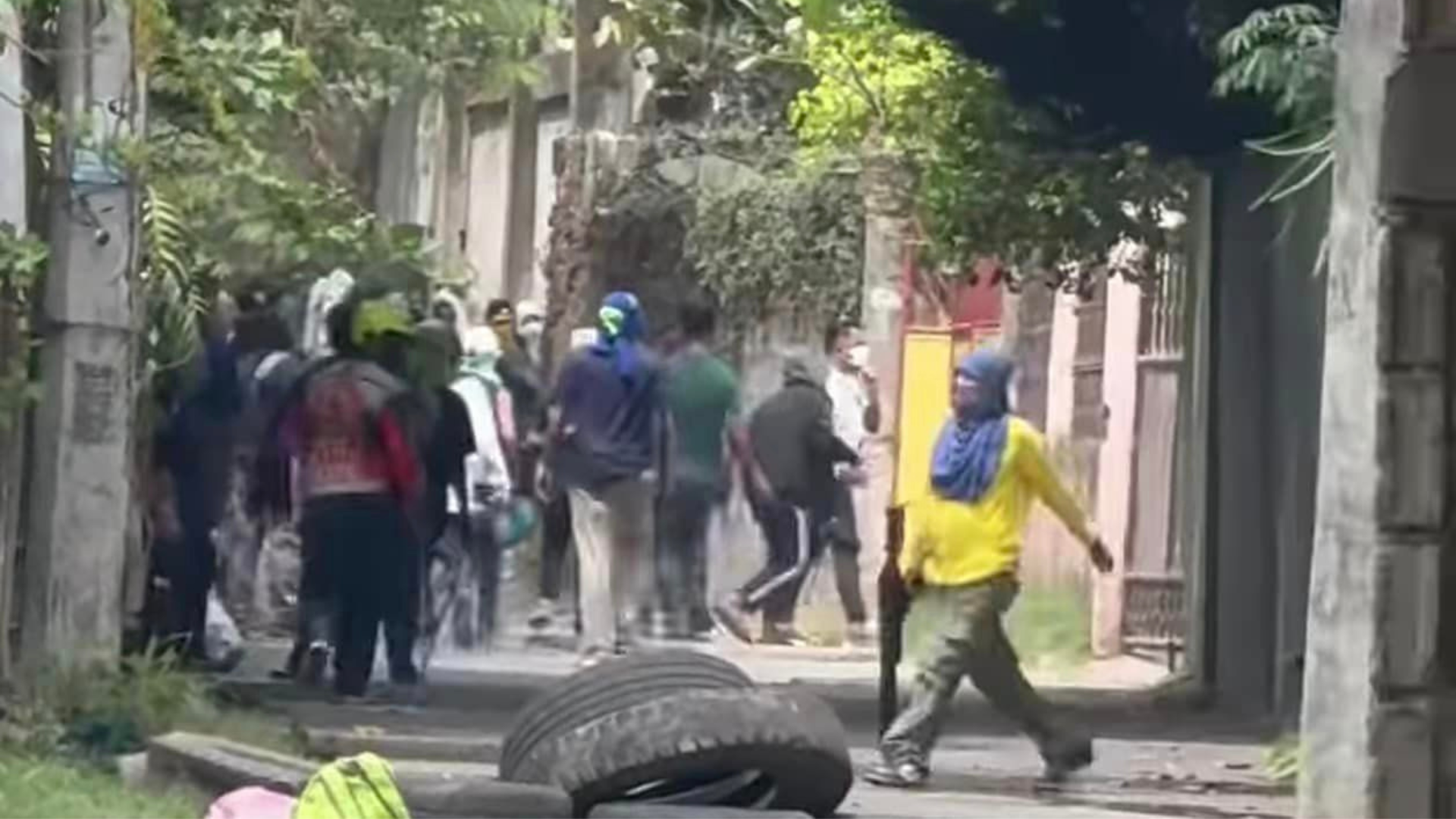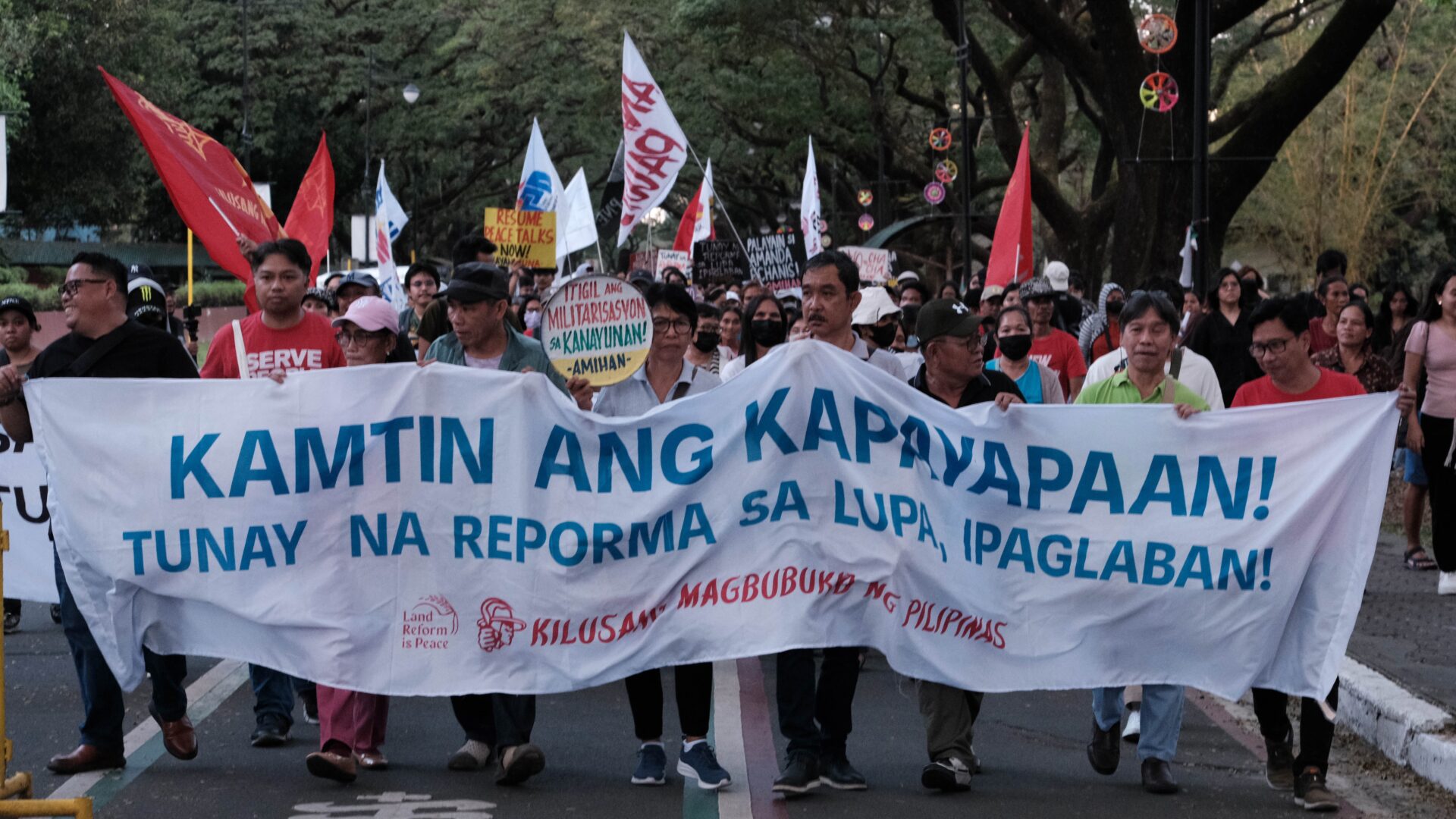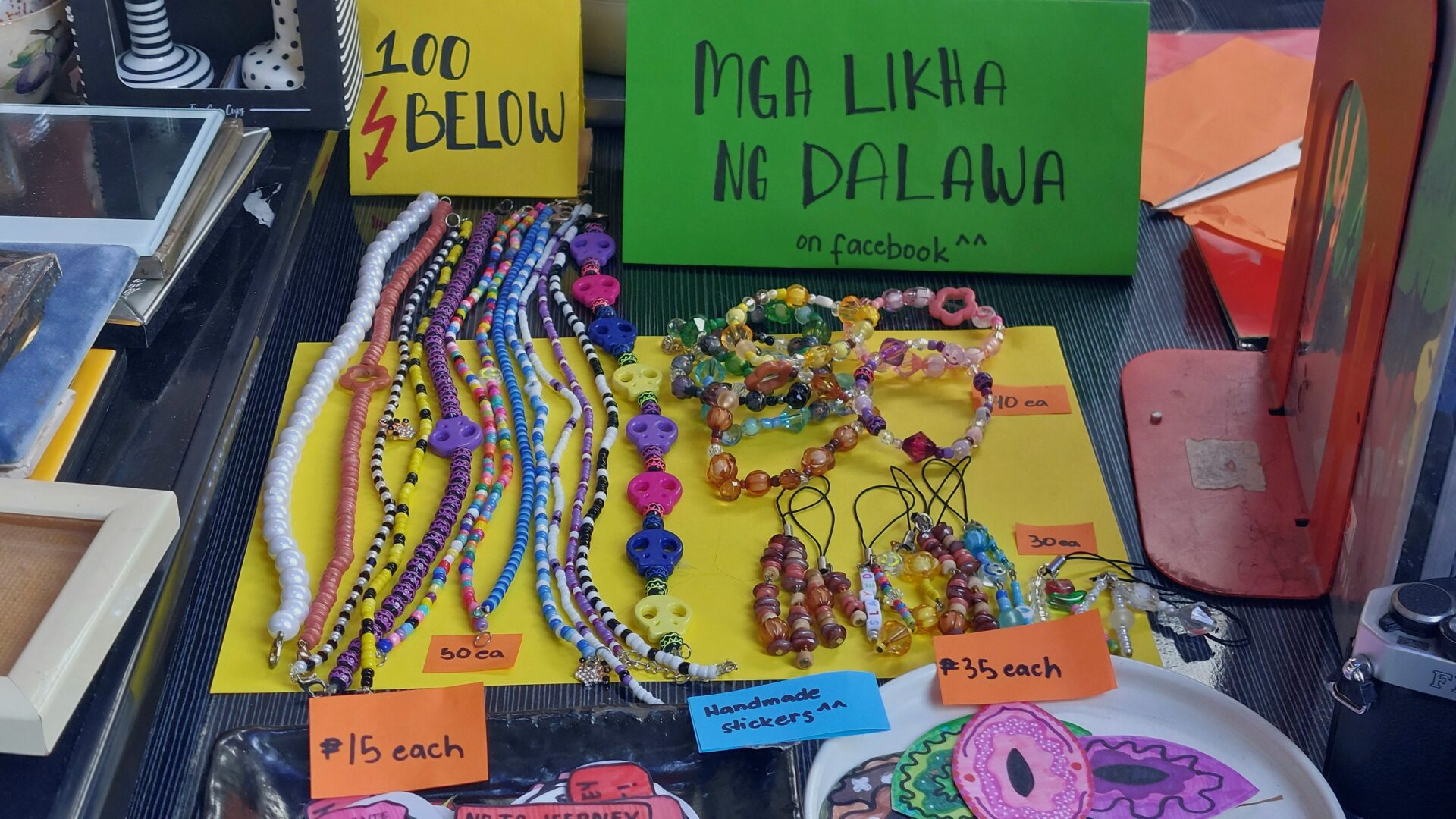A greening revolution through community empowerment
The success of urban farming is proof that if the support now being given to urban poor communities is practiced a hundred-thousand fold on a national scale and to cover all Filipino farmers, the country will solve its food security issues.
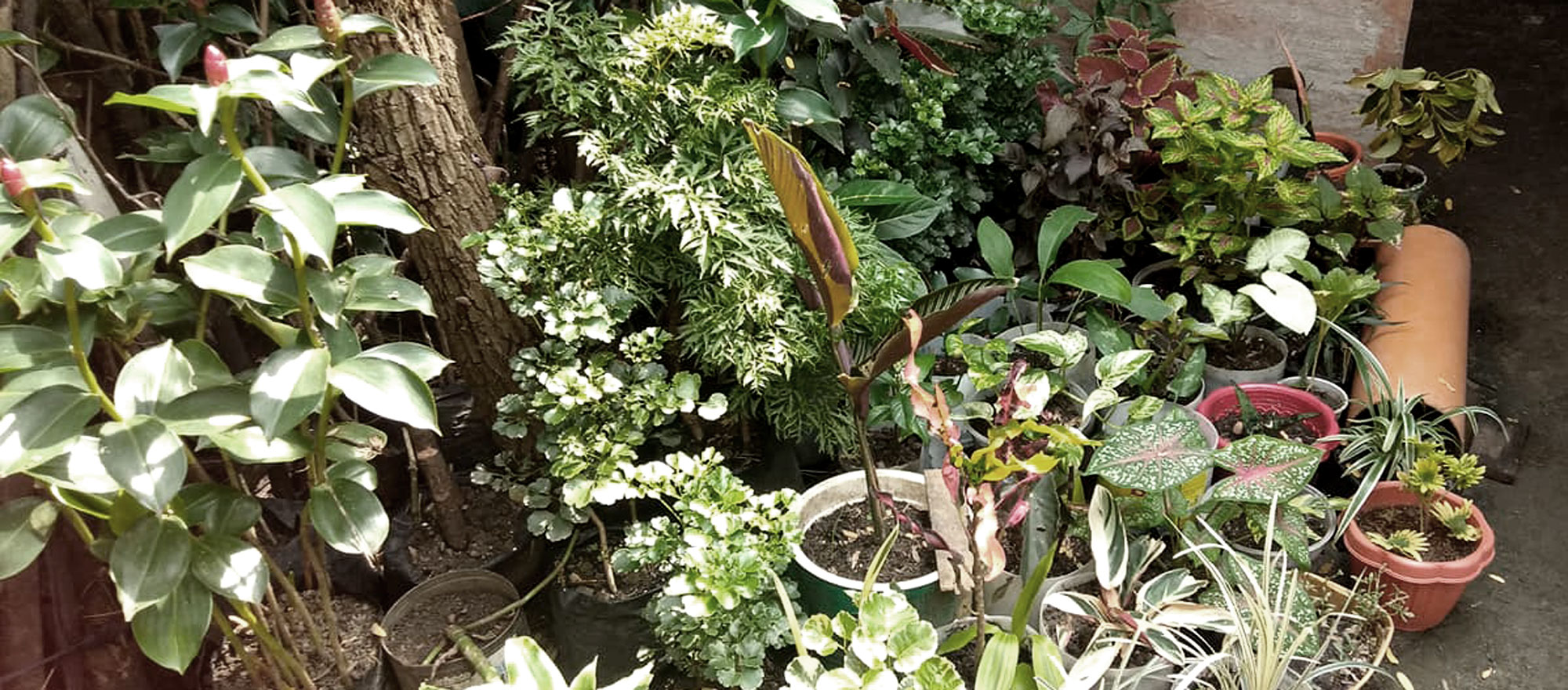
Farmer and agriculturalist Armando Sombilon Baring knows his trees, his seeds, and his plants. He mentions names like talinum, alibangbang, malabulak, siar, payung-payungan batino, libas, malapapayaya, ipil, yambo, toog, nato, tindalo, baloc baloc kawayang tinik, etc. like they are common place, but to ordinary Filipinos, they sound like foreign words.
“Mga puno at halaman yan na magandang tanim at palaguin sa mga kabundukan at mga bakanteng lupain, lalo na sa mga lungsod,” he explains. “Planting trees and restoring forests should be encouraged because they restore the topsoil. Trees absorb carbon dioxide and produce oxygen. Mahalaga ang mga puno.”
Prior to leaving the University of the Philippines and his course on Philippine Studies to work among farmers in Central Luzon, Armando was an officer of the League of Filipino Students (LFS) in UP. Born and raised by a family that has firm roots in agriculture, Armando’s own values reflect those of farmers – hard work, determination, and resilience. Now, he is using many of the values and lessons he learned from living with farmers and sharing them.
A natural born teacher, Armado is one of the thankfully growing number of advocates of urban gardening and permanent agriculture.
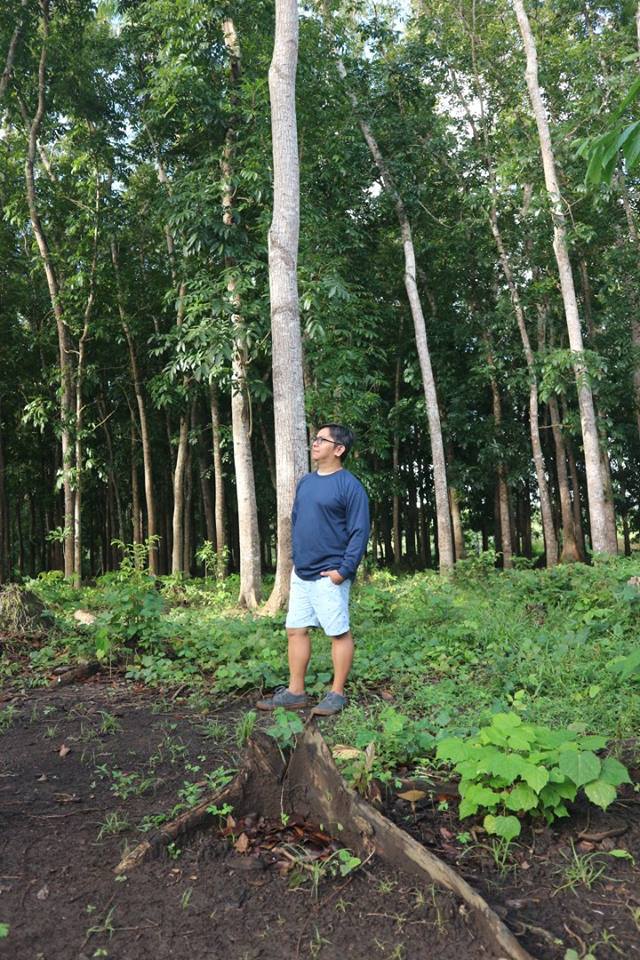
Permanent agriculture, beyond urban beautification
The concept of urban gardening is easy to understand and it’s already popular, but permanent agriculture – or permaculture — is somewhat new to ordinary Filipinos.
“Pag sinabing permaculture, ang itinatanim ay mga halamang pagkain at mga puno na hindi seasonal. Ibig sabihin, buong panahon, may nakatanim, at hindi yung pagkatapos ng anihan, nakatiwangwang ang lupa. Mahalagang bahagi din ng permaculture ang mga puno na natural na tumutubo sa Pilipinas, at hindi mga inangkat o imported na varieties,” he explained.
He further explained that permaculture advocates using renewable, sustainable energy sources. “Gamitin ang enerhiya ng araw, tubig mula sa ulan,” he said. Permaculture advocates promote the yse of water catchments to store rain water and tapping solar energy.
In keeping with their beliefs and learnings, Armando and his family have already established their own “laboratory” proving the benefits and sustainability of permaculture: they built Linang Natural Farms in Tagkawayan, Quezon. The farm is an effective and credible proof of concept of permaculture.
Permaculture also promotes the creation and cultivation of mini-forests, or growing trees endemic to the country. Armando said growing trees or maintaining mangroves and protecting forested areas encourages wildlife to flourish—especially birds, worms, bees, butterflies, and other insects.
“Ang mahalaga sa permaculture ay ang pagtataguyod ng natural environment, at kasama sa natural environment ang mga insekto at mga hayup. Nawala ang balanse sa kalikasan dahil sa pagkasira ng mga kakahuyan at gubat, at kasabay noon maraming species ng mga ibon at insekto ang Nawala. Established na ang masahol na epekto ng pagkasira ng balanseng ito sa mundo – nandyan ang mga pagbabago ng klima, ang malawakang soil erosion na nagresresulta sa mga pagguho ng lupa o landslides, ang mga baha. Lahat yan man-made. Ang kagyat ng epekto sa tao ay ang pagkawala ng food security dahil na rin sa massive land conversion. Kaya naming mapigilan ang lahat ng yan kung lahat ay aaksyon,” he said.
Working collectively for food security
As an activist since his college days in UP, Armando knows full well how the national government and its agencies have been mostly inutile when it comes to protecting the environment or ensuring the country’s food security. This is why, he argues, it is important that Filipinos take these matters into their own hands and become proactive.
“Ang seguridad sa pagkain ay dapat maging isang kilusan na nilalahukan at itinataguyod ng halos mayorya ng mamamayan. When countries run short of food, they need to find solutions fast, and one answer can be urban farming. We say an emphatic ‘yes’ to national food security and a strong ‘no’ to food importation. Walang dahilan para umasa tayo sa pag-iimport ng pagkain; mali na nakatali tayo sa pandaigdigang pamilihan pagdating sa presyuhan ng bigas at iba pang pagkain. Maling-mali rin na may mga nagugutom na mga magsasaka dahil sobrang binabarat ang presyo ng tinda nilang palay, at may Pilipinong hindi makabili ng bigas dahil naman sa sobrang taas na presyo nito.”
Armando shares his skills, knowledge, and expertise with various urban and rural poor communities and helps them put together communal gardens, farms, and forests. He attends training seminars sponsored the Department of Agriculture (DA), and he works with various government and non-government agencies to secure donations for seeds and seedlings, and then goes to partner-communities to teach residents on how they can maximize their immediate environment to grow food.
For instance, a project that Armando is now helping strengthen is the permaculture eco village in Rodriguez, Rizal. The village is actually a resettlement area for the survivors of the “garbageslide” in Payatas in 2002 that killed a total of 232 people and rendering 655 families homeless. The residents brought the land and developed it using their own savings and with the support of several non-government agencies.
When the Payatas garbage slide survivors first built their community, they had practically nothing,
“Madaming problema: walang sustainable na kabuhayan, walang kuryente, walang potable water at iba pa. Maraming kulang para balanseng makapamuhay ang mga pamily,” Armando shared. The permaculture project he is helping build is the personal initiative of the residents. “We’re not getting any funding for this. It’s purely just the residents making this possible.”
One of the most important – and obvious – considerations in urban farming is space: in the urban centers and city communities, there is limited space to plant in.
Earlier in September, Armando gave a training on how beneficial microbes and how to culture them for fertilizer.
Sa urban farming, mahalaga ang space dahil sa limitadong lupa na pagtataniman.
“Ito ang teknolohiyang ginagamit para sa sustainable food production ng community. Maaring gumawa ang beneficial microbes ng mga sustansya at mineral sa lupa para magamit ng mga halaman. Nakakagawa ito ng mga hormones na magpapasigla ng paglago, nagpapasigla sa tibay ng mga halaman, at nagpapalit o pumipigil sa stress nila. Mahalaga ang beneficial microbes sa pagtatanim at pag-aalaga ng lupa. Kapaki-pakinabang ito sa agrikultura dahil may mga tungkulin ito sa pagmementina at pagpapataba ng lupa, at sa pagkakabulok ng mga organikong bagay,” he explained.
And what’s even more important, culturing these microbes is inexpensive. The following is Armando’s recipe for growing them: 1 drum of rain water (or stocked water); 1/2 kilo of salt; 1/2 kilo of ripened banana hubs (saba variety); and very, very dried leaves. A drum of microbes costs less than P20.00, and when all the ingredients are mixed and left to ferment from 24 to 48 hours, the resulting mixture can be used to fertilize the soil.
“Dapat ine-encourage ang paggamit ng mga organic na pesticide at fertilizer at iwaksi na ang paggamit ng mga kemikal. Nakakasira ang mga kemikal sa lupa, at pag lumaon, nawawala na ang produktibidad nito. Sa permaculture, sinisikip nag awing laging produktibo ang lupa sa pamamagitan ng pagtatanim ng iba-ibang halaman,” he said.
The agro-activist is also an advocate of seed banking. He said that in farmers – including those into urban farming – should be encouraged to store and use heirloom seeds and open pollinated varieties.
“Maraming mga lokal na binhi ang pinatay ng mga foreign companies. Yung mga hybrid seeds na binebenta ng mga kumpanya, isang taniman lang, tapos wala na. Hindi na pwedeng itanim ulit. Magastos. Maraming mga magsasaka ang nababaon sa utang dahil pinilit na gumamit ng mga dayuhang varieties na isang taniman lang.”
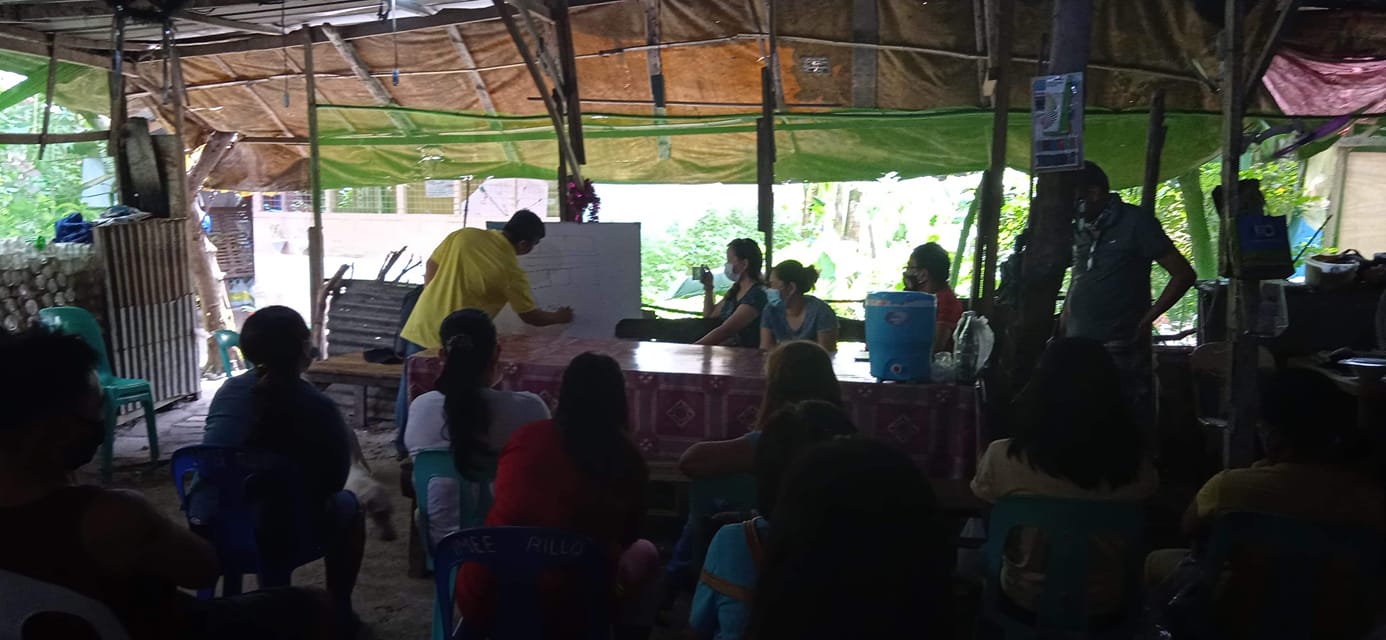
Beyond charity work
Armando has high hopes and ambitious plans for the community. He is confident in the collective will and strength of the residents who are the main movers of the project.
“Sa initial planning kasama ang mga residente, nagkaisa sila na itayo at ayusin ang kanilang communal vegetable farm at food forest farm bilang pagmumulan ng kabuhayan. Plano din sa hinaharap na makapagtayo ng solar submersible pump (pandilig, panlaba at panligo), mga solar lamps, lumilikha ng livelihood opportunities para sa sa mga nanay, maisaayos ang landscaping ng mga kalsada at mabuo ang arboretum as a bird sanctuary na later ay magiging ecotourism site,” he said.
Daniel Franklin E. Pilario, CM, from the St. Vincent School of Theology of Adamson University has lauded the urban gardening and permaculture efforts Armado and his colleagues have helped put up.
“A survey came out recently that the Philippines is one of the most vulnerable countries in terms of food sustainability during the pandemic. And this government does not seem to have a sustainable plan to avert impending hunger. From the start of the lockdown, there was one thing we feared in Payatas – hunger. “
Mr. Pilario wrote about a father who got down to the brass tacks of the problem and said “Covid na kung Covid. Ikulong na kung ikulong. Hindi ko lang matiis na makita ang mga anak kong tumitirik ang mga mata sa gutom.” (I don’t mind being infected with Covid, nor being detained. What I could not take is to see my kids die of hunger).
Mr. Pilario said that thousands of generous donors came to their aid and they distributed rice tomany families every week including bread, milk, vegetables, fish, and other basic consumables. He said that in that way, many families were saved from extreme hunger. After several months of these relief operations however, community leaders and volunteers — most of them women — began to ask themselves how long these activities could continue.
“These same women-leaders, who risked their lives to go out and distribute goods during the lockdown, decided to press on. They thought of using their meager space to plant – vegetables of all kinds. With the help of some technical people but mainly with their efforts, resolve and creativity, they now enjoy the harvest for their own families and neighbors,” Mr. Pilario said.
In a Facebook post, Mr. Pilario said that there are now 11 communal gardens under the care of Basic Ecclesial Communities (BEC) in the different areas of Ina ng Lupang Pangako Parish in Quezon City. Many individual families creatively use plastic containers, used tires and empty cans to plant vegetables for their daily consumption.
Logical, urgent response
Among the sustainable agriculture models that inspire Armando are those used in Cuba, a socialist country which, according to the Council for Hemispheric Affairs (COHA) has used sustainable and urban agriculture as its “ logical response of Cubans to their resource constraints. Traditional low-input agricultural techniques, based on organic pests’ control and crop diversification, has been the backbone of the ecological food production in Cuba.”
His own seminar has a significant title: “Introduksyon sa Permakultura: Papel sa Independienteng Pag-unlad ng mga Tao, Komunidad at Pagmamahal sa Kalikasan”.
“Ito naman talaga ang pangarap natin para sa mga magsasakang Pilipino – ang mabigyan sila ng todo-todong suporta para magawa nila ang kanilang malaking ambag sa lipunan na tagalikha ng pagkain and tagapangalaga na rin ng kalikasan,” he said.
He pointed out that the success of urban farming is proof that if the support now being given to urban poor communities is practiced a hundred-thousand fold on a national scale and to cover all Filipino farmers, the country will solve its food security issues.
“Unahin ang repormang agraryo – lupa pa rin ang pinakamalaking problema. Pag may lupa na ang mga magsasaka, ibigay sa kanila ang lahat ng posibleng suporta mula sa panahon ng taniman, anihan, pag-iimbak, transportasyon sa pamilhan, hanggang sa bentahan. Ang mga magsasaka ang bumubuhay sa lipunan natin – kailangan silang suportahan sa paraang buo at komprehensibo,” he insisted.
Armado has also given workshops on composting for households, teaching how families can collectively work together to manage their waste materials. He shared that residents aim to rely on and mainly use locally available resources in community so that expenses will be minimal. This, he also said, is an important lesson that is taught to community farmers.
“Manggagaling mula sa kanila ang sariling pagtaas ng antas ng pamumuhay. Sariling lakas nila ang magpupundar sa kanilang kabuhayan. Sa Payatas, halimbawa, aasa 255 families ang target beneficiaries. Sa pagkakaisa nila, maraming magagawa,” he said. “Mahirap ang mga gagawin at hindi kami nangangako na magagawa lahat dahil sa kakulangan o kawalan ng resources, pero tiwala kami na kakayanin basta sama-sama kahit sa gitna ng pandemya.”
In his own FB page, Armando shares the many achievements of various urban poor communities when it comes to urban gardening. Among those achievements? Residents in Brgy. Botocan, also in QC, are now growing grapes!
For their part, members of the Amlac Ville Communal Farm in Payatas B are planting malunggay and kakawate in contour lines to stop soil erosion and to protect the top soil. They are also able to harvest their crops of kangkong, mustasa, pechay, sweet potato, saluyot, and malunggay two to three times a week and sell them to the neighborhood. The proceeds are plowed back into the collective fund and will be used for future agri projects.
“Maganda na may ginagawa rin ang LGU para isulong ang urban gardening, pero ang talagang magtutiyak sa tagumpay ng proyekto ay yung sama-samang commitment at paggampan ng mga residente. Ganoon kasi ang tunay na empowerment: hindi umaasa sa gobyerno o sa tulong ng mga ahensya lang. Mamamayan mismo ang nagtataguyod sa kanilang sarili,” he said.
And what is the role of experts, agriculturalists, and scientists in all of this?
“Ang papel ng mga eksperto ay tumulong at magbigay ng suporta sa mga gustong mag-urban farming, lalong-lao na sa mga maralitang komunidad. Pag sa mga marginalized communities, syempre libre ang mga pag-aaral at mainam na makakuha ng mga donasyon para sa mga panimulang pananim nila – mga seedlings, cuttings. Ang layunin natin ay mapalaganap ang kaalaman, makatulong sa mga tao na tulungan ang kanilang sarili na umangat sa gutom at kahirapan. Pag lumaon, mas maraming magagawa para paunlarin ang sarili, at pag lumaon, ang lipunan.”
And this is how a (green) revolution begins.

